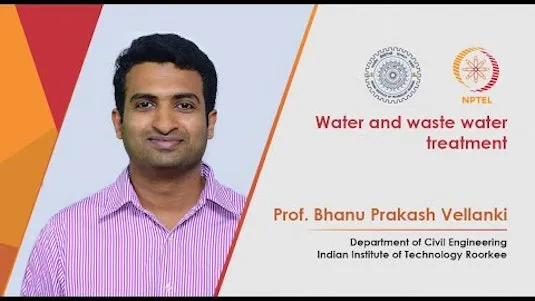
Water and waste water treatment 
This online course provides an introduction to water and wastewater treatment, covering topics such as water sources, water quality, treatment processes, and treatment plant design. Students will learn about the importance of water and wastewater treatment for public health and environmental sustainability. ▼
ADVERTISEMENT
Course Feature
![]() Cost:
Cost:
Free
![]() Provider:
Provider:
Swayam
![]() Certificate:
Certificate:
Paid Certification
![]() Language:
Language:
English
![]() Start Date:
Start Date:
22nd Jan, 2023
Course Overview
❗The content presented here is sourced directly from Swayam platform. For comprehensive course details, including enrollment information, simply click on the 'Go to class' link on our website.
Updated in [April 12th, 2023]
This course provides an overview of water and waste water treatment. It covers the headworks to the final disinfection and disinfectant removal, as well as the design of these processes. The water treatment portion of the syllabus covers the details of treatment and the relevant aspects post-treatment, such as residual removal. This course will provide students with the basics and concepts for further in-depth learning.
Intended audience: Civil Engineering and Environmental Engineering/Science students
Prerequisites: None
Industry support: None
[Applications]
This course provides students with a comprehensive understanding of water and waste water treatment. Students will gain knowledge of the headworks, design, and post-treatment processes, such as residual removal. This course is beneficial for Civil Engineering and Environmental Engineering/Science students, and does not require any prerequisites. After completing this course, students can apply their knowledge to further their studies in water and waste water treatment, as well as use it to support industries that specialize in this field.
[Career Paths]
1. Water Treatment Plant Operator: Water treatment plant operators are responsible for the operation and maintenance of water treatment plants. They monitor the water quality, adjust the chemical levels, and ensure that the plant is running efficiently. As the demand for clean water increases, the need for water treatment plant operators is expected to grow.
2. Wastewater Treatment Plant Operator: Wastewater treatment plant operators are responsible for the operation and maintenance of wastewater treatment plants. They monitor the water quality, adjust the chemical levels, and ensure that the plant is running efficiently. As the demand for clean water increases, the need for wastewater treatment plant operators is expected to grow.
3. Environmental Engineer: Environmental engineers are responsible for designing and implementing solutions to environmental problems. They use their knowledge of engineering, biology, and chemistry to develop solutions to environmental issues such as air and water pollution, waste management, and climate change. As the demand for clean water and air increases, the need for environmental engineers is expected to grow.
4. Water Resources Engineer: Water resources engineers are responsible for designing and implementing solutions to water-related problems. They use their knowledge of engineering, hydrology, and ecology to develop solutions to water-related issues such as water supply, water quality, and flood control. As the demand for clean water increases, the need for water resources engineers is expected to grow.
[Education Paths]
1. Bachelor of Science in Environmental Engineering: This degree program focuses on the study of the environment and how to protect it from pollution and other forms of degradation. Students learn about the principles of environmental engineering, including water and air pollution control, waste management, and environmental health and safety. This degree is becoming increasingly important as environmental issues become more pressing.
2. Master of Science in Water Resources Engineering: This degree program focuses on the study of water resources and how to manage them in a sustainable way. Students learn about the principles of water resources engineering, including hydrology, hydraulics, water quality, and water resource management. This degree is becoming increasingly important as water resources become more scarce and the need for sustainable management of these resources grows.
3. Doctor of Philosophy in Environmental Science: This degree program focuses on the study of the environment and how to protect it from pollution and other forms of degradation. Students learn about the principles of environmental science, including ecology, conservation, and environmental policy. This degree is becoming increasingly important as environmental issues become more pressing and the need for research and policy solutions grows.
4. Master of Science in Environmental Management: This degree program focuses on the study of the environment and how to manage it in a sustainable way. Students learn about the principles of environmental management, including environmental law, environmental economics, and environmental policy. This degree is becoming increasingly important as environmental issues become more pressing and the need for sustainable management of these resources grows.
Course Provider

Provider Swayam's Stats at AZClass
This course provides a solid introduction to water and wastewater treatment, covering key topics such as sources, quality parameters, treatment processes, and plant design.
Discussion and Reviews
0.0 (Based on 0 reviews)
Explore Similar Online Courses

Dialectical Behaviour Therapy (DBT) - ACCREDITED CERTIFICATE

Childcare Course for Vulnerable Children : FutureLearn

Python for Informatics: Exploring Information

Social Network Analysis

Introduction to Systematic Review and Meta-Analysis

The Analytics Edge

DCO042 - Python For Informatics

Causal Diagrams: Draw Your Assumptions Before Your Conclusions

Whole genome sequencing of bacterial genomes - tools and applications

Educating for Sustainable Development (ESD) in Schools and Universities

Potable water treatment


Start your review of Water and waste water treatment